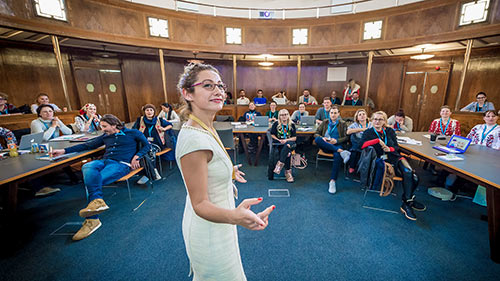Search
Law and Practice LLB (Hons)
Study level: UndergraduateHNC/HND courses

Studying law can lead you to a variety of exciting career options including barrister, solicitor or legal executive.
Course features
Year of entry
Location
CU London (Dagenham, London)
CU London (Greenwich, London)
Study mode
Full-time
Sandwich
Duration
4 years sandwich
3 year - Degree
2 year - HND
1 year - HNC
Course code
M102 / M103 / M104
Start date
January 2026
March 2026
May 2026
June 2026
Course overview
Filled with intrigue and complexities, law is a fascinating and exciting subject area that is an essential component of everyday life.
Success in this field demands discipline, strategic thinking, a solid knowledge of legislation and the ability to adapt to different scenarios. As legal knowledge is key for success in this career, this course focuses on teaching you key theoretical principles, with fundamental best practices such as making succinct legal arguments.
Why you should study this course
The course:
- aims to provide a thorough understanding of law and practice in modern-day circumstances.
- focuses strongly on practical aspects of substantive law as well as procedural law covers a wide variety of topics, ranging from Criminal Law, Contact Law, Public and Human Rights Law, Tort Law, Land and Property Law to Civil and Criminal Procedures
- focuses strongly on developing practical real-world skills. Supports you to develop mooting, advocacy and presentation skills, building a solid foundation for you to become a competent and knowledgeable practitioner of law, therefore provides you with a better opportunity to enter the legal job market
- is designed to ensure that you acquire necessary legal skills, knowledge of law, attitudes and competence which can provide you with enough confidence to subsequently undertake vocational component of Legal Professional Courses and Assessments such as Bar Training Course and the Solicitors Qualifying Exam (SQE). Subject to additional exams, training and costs.
What you'll study
We regularly review our course content, to make it relevant and current for the benefit of our students. For these reasons, course modules may be updated.
How you'll learn
This course is available as a full-time three-year or optional four-year sandwich course, the latter incorporating a work placement or study year in a related field2.
Our teaching methods are varied, offering a number of teaching styles, so in addition to lectures, we utilise a blended learning approach, including online aspects, workshops and group work.
Progression through the modules develops knowledge and skills, including communication (written and oral), study skills, research methods, project management, presentation and career development. We will also encourage you to consider your employability and/or entrepreneurial development.
Unlike traditional institutions, there are no end-of-year exams. Instead, learning is assessed through coursework, oral presentations and phase tests, which are more reflective of our learning model.
Teaching contact hours
As a full-time undergraduate student, you will study modules totalling 120 credits each academic year. A typical 20 credit module requires a total of 200 hours study. This is made up of teaching contact hours, guided and independent study.
Teaching hours:
Teaching hours vary each semester, year of study and due to module selection. During your first year you can expect 15-18 teaching hours each week. You will also have the option to attend optional sessions including time with a progress coach or to meet with staff for advice and feedback. As you progress through your studies, teaching hours may reduce.
Guided and independent study:
Throughout your studies, you will be expected to spend time in guided and independent study to make up the required study hours per module. You'll be digging deeper into topics, review what you've learnt and complete assignments. This can be completed around your personal commitments. As you progress through your studies, you'll spend more time in independent study.
Online learning:
As an innovative university, we use different teaching methods including online tools and emerging technologies. So, some of your teaching hours and assessments may be delivered online.
Assessment
The learning outcomes of modules, assignments and projects will be clearly stated. Your work will be marked according to how well you achieve these learning outcomes and your final feedback will refer to each outcome, as well as providing an overall percentage grade.
Assessment methods vary and may include practical class and project performance, written practical reports, tutorial tasks and assessments.
Course breakdown:
- coursework and written assessments
- phase tests
- civil and criminal mock advocacy
- client interviewing,
- negotiation exercise.
The Coventry University Group assessment strategy ensures that our courses are fairly assessed and allows us to monitor student progression towards achieving the intended learning outcomes.
Entry requirements
Typical entry requirements:
Fees and funding
| Student | Full-time | Part-time |
|---|---|---|
| UK, Ireland*, Channel Islands or Isle of Man | £9,535 per year | Not available |
| EU | £9,535 per year with EU Support Bursary** £14,800 per year without EU Support Bursary** |
Not available |
| International | £14,800 per year | Not available |
If you choose to study this course with a professional placement2 or study abroad year, you will need to pay a tuition fee3 to cover your academic support throughout your placement year. Students commencing their professional placement in the academic year 2027/28 will pay £1,500 if they are paying UK fees, or £1,800 if they are paying international fees.
For advice and guidance on tuition fees and student loans visit our undergraduate finance page and see the university’s Tuition Fee and Refund Terms and Conditions.
The University will charge the tuition fees that are stated in the above table for the first Academic Year of study. The University will review tuition fees each year. For UK (home) students, if Parliament permits an increase in tuition fees, the university may increase fees for each subsequent year of study in line with any such changes. Note that any increase is expected to be in line with inflation.
If you choose to study this course with a professional placement, the University will charge the tuition fees stated above for those on a placement during Academic Year 2027/28. The University will review professional placement tuition fees each year. For UK (home) students, the University may increase fees for each subsequent year of study, but such that it will be no more than 5% above inflation.
For international students, we may increase fees each year, but such increases will be no more than 5% above inflation. If you defer your course start date or have to extend your studies beyond the normal duration of the course (e.g. to repeat a year or resit examinations) the University reserves the right to charge you fees at a higher rate and/or in accordance with any legislative changes during the additional period of study.
We offer a range of international scholarships to students all over the world. For more information, visit our international scholarships page.
Tuition fees cover the cost of your teaching, assessments, facilities and support services. There may be additional costs not covered by this fee such as accommodation and living costs, recommended reading books, stationery, printing and re-assessments should you need them.
The following are additional costs not included in the tuition fees:
- Any optional overseas field trips or visits: £400+ per trip.
- Any costs associated with securing, attending or completing a placement (whether in the UK or abroad).
*Irish student fees
The rights of Irish residents to study in the UK are preserved under the Common Travel Area arrangement. If you are an Irish student and meet the residency criteria, you can study in England, pay the same level of tuition fees as English students and utilise the Tuition Fee Loan.
**EU Support Bursary
Following the UK's exit from the European Union, we are offering financial support to all eligible EU students who wish to study an undergraduate or a postgraduate degree with us full-time. This bursary will be used to offset the cost of your tuition fees to bring them in line with that of UK students. Students studying a degree with a foundation year with us are not eligible for the bursary.
Facilities
If you're studying at CU London Dagenham, you’ll be based in the grade II listed spacious former Civic Centre. If you choose to study at CU London Greenwich, you'll be based in the heart of the Greenwich Peninsula, just a 3-minute walk from North Greenwich tube station and the Jubilee line.
CU London Dagenham facilities include:
- moot room (or mock courtroom) where you - our law and practice students can argue hypothetical legal cases, similar to real courtroom proceedings, to hone your advocacy and legal research skills
- classrooms with interactive teaching capabilities
- comprehensive library and learning services
- study areas, laptops/open-access computers and social spaces, free Wi-Fi
- student support and careers advice teams
- onsite free student parking.
CU London Greenwich facilities include:
- classrooms with interactive teaching capabilities
- comprehensive library and learning services
- study areas, laptops/open-access computers and social spaces, free Wi-Fi
- access to student support, careers, and student success teams
- bike lockers.
Facilities are subject to availability. Access to some facilities (including some teaching and learning spaces) may vary from those advertised and/or may have reduced availability or restrictions where the university is following public authority guidance, decisions or orders.
Careers and opportunities
With an ever-growing demand for legal professionals in all industries, graduates of a law course have an expansive list of career paths to explore. Many students have progressed directly into a legal position, while some students have also chosen to study further in the field by undertaking a master’s degree in specialised subjects such as international law.
Graduates from this course have a variety of professions to explore, such as Costs Negotiator, Chartered Legal Executive, Barrister or Solicitor.
On successful completion, you should be able to:
- demonstrate understanding and knowledge of the theoretical, analytical and practical aspects of legislation and processes.
- be proficient in collating and evaluating evidence, with enhanced advocacy and advisory skills.
- develop appropriate analysis techniques, alongside the ability to undertake reliable and thorough research of case law, law commissions, statutes and more.
- apply appropriate presentation skills to confidently establish the significance of the data produced.
Where our graduates work
Previous law graduates have gone on to work at a wide variety of organisations and firms including DWF LLP, Uber and Central England Law Centre.









